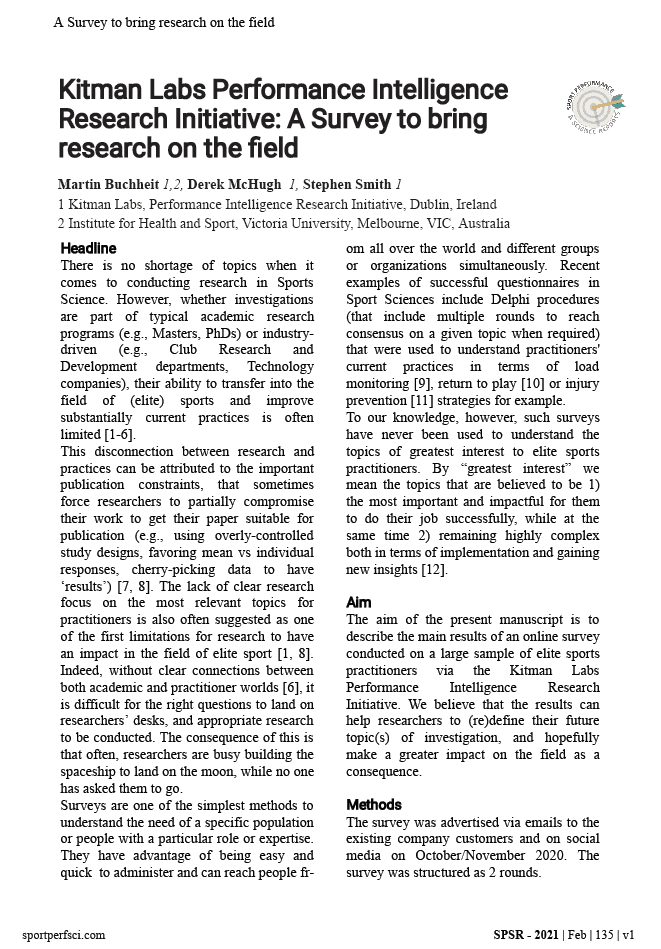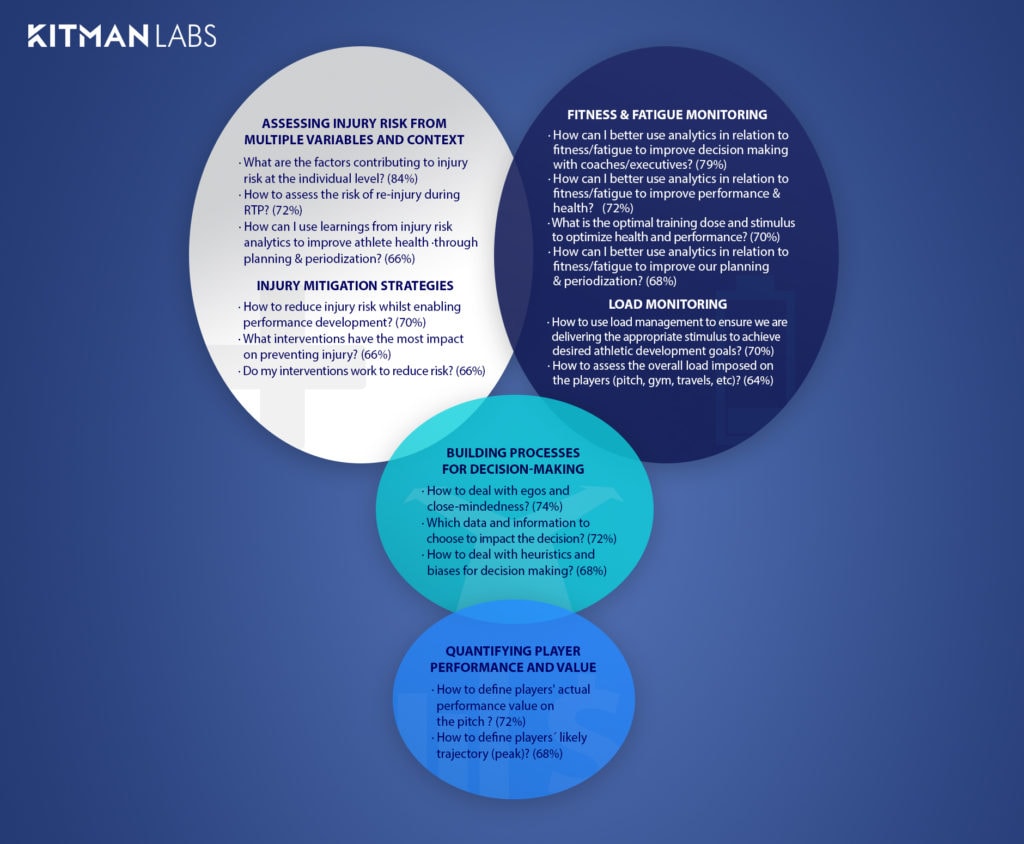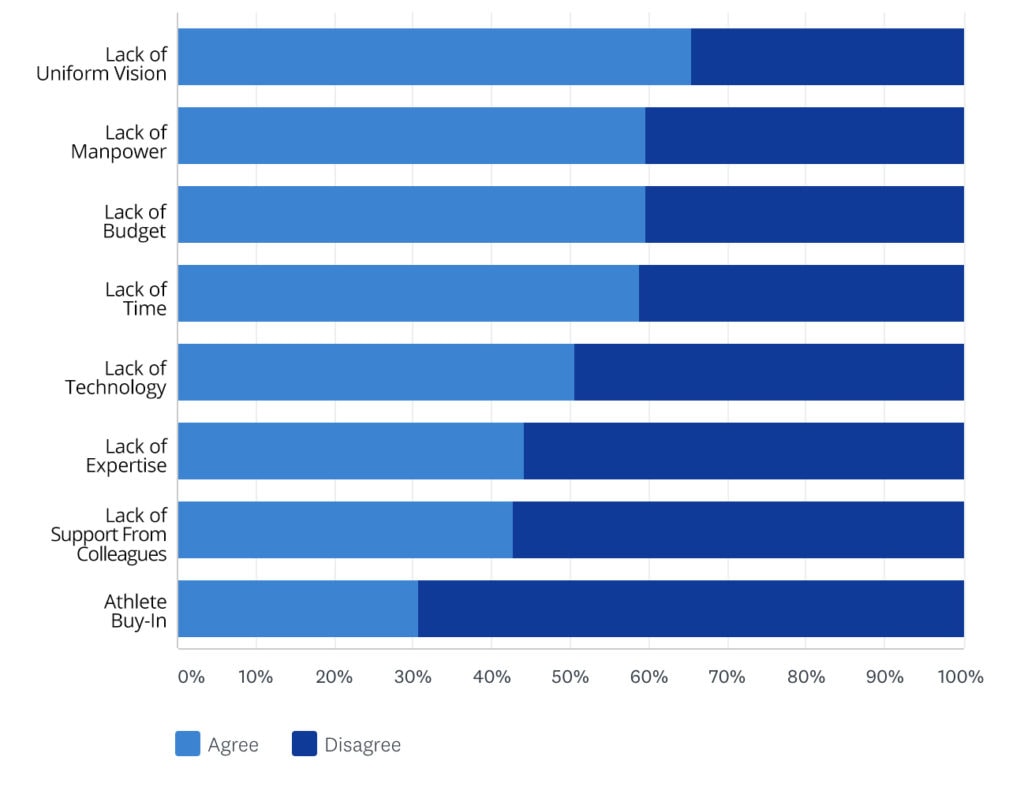The Kitman Labs Performance Intelligence Research Initiative has identified the most urgent needs confronting elite sports practitioners – as they define them. Our just-published practitioner survey surfaced the most pressing needs across sports and roles, pointing a path for future research to sharpen its focus on what matters most for on-field results.
Why did we launch the Performance Intelligence Research Initiative (PIRI)?
A decade of evolution in performance science helped our industry generate valuable tools and solutions and amass significant volumes of research. But too often there is a disconnect and sometimes even a wide gap between the technological and academic work and practical implementation that solves the real burning strategic and tactical issues confronting elite sports practitioners every day. The synapse is too wide.
We want to fix that.
Elite sport is dynamic with new challenges breaking daily. As past practitioners who lived elite sport’s incredibly fast day-to-day, we know how rapidly the environment evolves and the gaps that can open when research cannot move at the same pace. PIRI is a mechanism to bridge those gaps, to help our industry evolve as fast as practitioners do — at the speed of sport — to complete the circuit and translate insights into on-field action.
Cultivating a dynamic, diverse research community
PIRI does not reside solely within Kitman Labs walls or even in the walls of our customers. We are developing and growing a community of practitioners across all types of sports organisations, academics across the globe, and experts with deep experience. By fostering an active group with diverse perspectives, we see a future of interesting, sound, and practical research to support changing needs and guide technology advances. By staying in close touch with practitioners we’ll form an interactive dialog that keeps us up to speed and in the real world.
Creating a two-way research dialog starts with listening
We’re investing in open research because we want this effort to be more than transactional. Without clear connections between both academic and practitioner worlds, it’s too difficult for the right questions to land on researchers’ desks, and appropriate research to be conducted.
For PIRI’s inaugural project, we developed a survey to identify the needs of industry today and ascertain which are being met and which aren’t. The strength of our responses from multiple practitioners across medicine, performance, coaching confirmed a need for just such an approach.
Practitioner Survey Results
We started by listening to the people working on the frontlines with teams everyday. We wanted to get out and talk to practitioners – and not just our own clients.
Over two rounds, our online survey sampled 230 elite sports practitioners to help researchers refine future topics of investigation for more consequential results.
For the published paper on our method, read the full survey results here.

Regardless of country, sport, or persona, respondents spoke to similar problems. The following were the most-rated as both highly important and complex to understand or implement:
- Assessing injury risk from multiple variables and context (70% of respondents rating it as both important and complex), and the associated injury mitigation strategies (60%)
- Load (60%) and Fitness & Fatigue Monitoring (65%)
- Quantifying player performance and value (63%)
- Building processes for decision-making (61%)
See Figure 1 below for more details on the specific issues practitioners face

The three most important barriers to implementation and challenges faced for the three most important topics were related
- Lack of uniform vision between colleagues
- Lack of budget and manpower
- Lack of time

Of note, 65% of survey respondents were not clients of Kitman Labs. We regard this as an especially strong signal of the wider appeal of PIRI’s work and mission and we’re eager to hear from those holding approaches or philosophies different from our own. In fact, that’s what this is all about.
How should the research community respond?
As teams increasingly look to evolve to modern, collaborative, data-informed organizations that are sustainable and perform consistently, researchers should consider broadening the spectrum of their research.
To us this means extending the traditional physiological/performance/data science-focused research all the way through implementation and impact. It means also uncovering and validating methods to effectively contextualize, share, communicate and collaborate around data and insights to drive alignment, make decisions, create change and foster continuous improvement.
The survey highlighted the need for research in a few different areas:
Delivering holistic solutions: The survey’s results tell us industry is maturing: elite organizations don’t want point solutions; they want holistic, organizational answers that meet the needs identified above. Critically, there’s real desire among organizations to change how they operate to build consensus and gain alignment to achieve performance and health goals. This independently confirms our belief that industry has truly entered the age of performance intelligence. Research can validate proven approaches to using data to create this alignment and develop a shared plan for success.
Supporting decision making: In recent years, our industry’s technological focus has been on devices, sensors, data management, visualization, and not on building tools to support decision making. The insights gained here lead us to believe the next era of technology should shift its emphasis to supporting expert decision making, particularly in optimizing practitioners’ time, use of progressive analytics, collaboration among staff and processes on and off the pitch. Big data’s revolution was successful and a new nation of data now exists. What’s needed are better ways of bringing this information into daily practice for better decisions, clearer communication, and greater alignment. Research can help surface the best ways to visualize, contextualize, and share information for fast, high impact action.
Growing common vocabulary: In addition to the organizational change referenced above, practitioners want the ability to learn together with a common vocabulary – a lingua franca of performance within and across organizations tailored to data for shared vision and understanding. Research can identify successful methods for building shared mental models establishing a common language of performance.
Calling all practitioners
Moving forward, PIRI will remain laser focused on strengthening the relevance of sports science research and accelerating the speed with which research grounded insights can jump the synapse to action. But we can’t do it alone. We invite others – researchers, companies, nonprofits and clubs – to join us in this collaborative effort. Whether we’ve worked together previously or not, we’re welcoming alternative perspectives and conflicting philosophies to develop the next-generation of solutions for elite sport.
Read the published report here:
Join the Initiative!
Tell us what you think about the research, gain access to our publications, and participate in our research programs.



 More than Equal’s mission is to close the gender gap in motor sports and find and develop the first female Formula 1 world champion. They will now have an advanced operating system to centralize data for female drivers participating in More than Equal’s pioneering Development Programme.
More than Equal’s mission is to close the gender gap in motor sports and find and develop the first female Formula 1 world champion. They will now have an advanced operating system to centralize data for female drivers participating in More than Equal’s pioneering Development Programme.